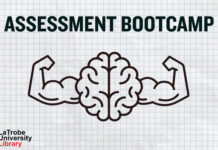Ever wondered what all the fuss is about mindfulness? We caught up with La Trobe Associate Lecturer in Psychology, Rachael Heckenberg, to talk about the science behind mindfulness, how it works and the ways you can practise it every day.
In Australia, 64% of students report high levels of stress and poor mental health. These statistics have only increased since COVID-19. If you’re feeling disengaged from your studies, stressed, overwhelmed and not sure how to cope you are not alone. One strategy that has become increasingly popular both in research and media as a way to combat stress and improve wellbeing is mindfulness.
What exactly is mindfulness?
The term “mindfulness” is often used interchangeably to describe both a trait and a meditation.
Trait mindfulness or being mindful, refers to the ability to purposefully bring your attention to the present moment. It is to be aware of your current internal and external experiences whether positive, negative, or neutral without judgement and with a sense of openheartedness, curiosity and kindness. Bringing awareness and acceptance to the now can reduce our tendency to ruminate or avoid certain thoughts, feelings, and experiences.
Mindfulness meditation is the practice of being mindful. Engaging in mindfulness meditation gives us the opportunity to take a breath and connect with what is going on within and around us in the current moment. Like building any new skill, regular meditation training can help us become more mindful in our everyday lives. Living more mindfully helps to reduce reactive, negative thoughts and overthinking and find a sense of calmness, particularly during stressful situations.

The science behind mindfulness
Mindfulness has been spouted as a “cure” for all types of ailments from unproductivity to poor health. While it is certainly not the cure-all it is sometimes made out to be, there is a range of benefits associated with being more mindful and engaging in mindfulness meditation.
Individuals who tend to be more mindful in their day-to-day lives are generally more optimistic, have higher self-esteem, are more flexible and less automatic in their thinking, and show better emotional and behavioural regulation. Higher trait mindfulness can also improve social relationships as it is associated with being more other-oriented and less self-focused.
Mindfulness-based meditation programs are also effective in decreasing stress, improving mental health, physical health and sleep, reducing feelings of worry, and increasing energy, concentration and productivity. Mindfulness has also been shown to improve academic performance. Mindfulness meditation training can also increase immunity, reduce stress hormones such as cortisol, and affect different brain regions. So the benefits we see are not just from self-report but can also be more objectively measured.

How to implement mindfulness?
There are two ways you can practice mindfulness: formal meditation and informal practice.
Formal Practice
Formal meditation is where you set time aside to (typically) sit with your eyes closed and practice focusing your attention on one thing, usually your breath or bodily sensations. If you’re worried about starting because you think you won’t be able to “clear your mind” then mindfulness meditation may just be the thing for you. Mindfulness meditation is not about emptying the mind of thoughts, it is about letting yourself experience different thoughts and feelings without engaging in them. A guided meditation might be particularly useful here, as the cues can help bring you back to the present if you get distracted by a train of thought.
Traditional mindfulness meditation programs usually recommend 45 minutes of meditation per day. If you’re like me, this might seem like an impossible task given all the other commitments you have at the moment. The good news is more and more studies are showing that shorter mindfulness meditation sessions can still be useful. So, think about how much time you can set aside each day, or even just a few times per week, and aim for that. You can always build on this the next week!
Informal Practice
Informal practice involves bringing mindfulness into your daily routine by focusing your full attention to what you are doing in the present moment. Many everyday activities can be done whilst being mindful, for example, doing the dishes, eating, going for a walk or studying. The key here is to be non-judgemental and focus your attention to the task. It is important to be kind to yourself and gently bring your awareness back if you begin to get distracted.
There is no time like the present – get started today!
La Trobe offers this great free guide to mindfulness to get you started or there are a number of free apps you can download. It is always hard to make time when you’re feeling stressed and overwhelmed, but a mindful walk or a mindful moment may just be the thing you need!















